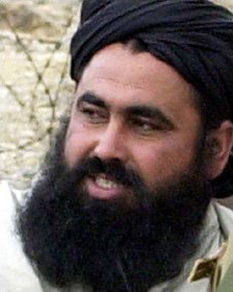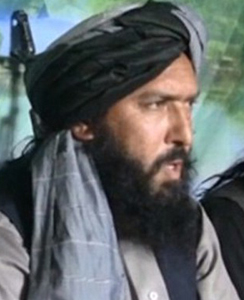Related Research Articles

Abdullah Mehsud was a Pashtun militant commander who killed himself with a hand grenade after security forces raided his dwelling in Zhob, Balochistan, Pakistan. He belonged to the Mahsud tribe.

Baitullah Mehsud was one of the founders and a leading member of the TTP in Waziristan, Pakistan, and the leader of the Tehrik-e-Taliban Pakistan (TTP). He formed the TTP from an alliance of about five militant groups in December 2007. He is thought by U.S. military analysts to have commanded up to 5,000 fighters and to have been behind numerous attacks in Pakistan including the assassination of Benazir Bhutto which he and others have denied.
Maulvi Faqir Mohammed is an Islamist militant and, until March 2012, a deputy leader of the Pakistani Taliban umbrella group Tehrik-i-Taliban Pakistan. He was reported as killed on 5 March 2010 during a helicopter gunship attack on militants by the Pakistani military although he denied the reports as false. In July 2011, he resurfaced on the air broadcasting radio shows out of Afghanistan. He was captured in Afghanistan on 17 February 2013, and released by the Afghan Taliban in 2021.

The insurgency in Khyber Pakhtunkhwa, also known as the War in North-West Pakistan or Pakistan's war on terror, is an ongoing armed conflict involving Pakistan and Islamist militant groups such as the Tehrik-i-Taliban Pakistan (TTP), Jundallah, Lashkar-e-Islam (LeI), TNSM, al-Qaeda, and their Central Asian allies such as the ISIL–Khorasan (ISIL), Islamic Movement of Uzbekistan, East Turkistan Movement, Emirate of Caucasus, and elements of organized crime. Formerly a war, it is now a low-level insurgency as of 2017.

Qari Hussain Ahmad Mehsud was a top lieutenant in the Tehrik-i-Taliban Pakistan (TTP) and the organizer of the group's suicide bombing squads. He was a cousin of Hakimullah Mehsud.

The Pakistani Taliban, formally called the Tehreek-e-Taliban-e-Pakistan, is an umbrella organization of various Islamist armed militant groups operating along the Afghan–Pakistani border. Formed in 2007 by Baitullah Mehsud, its current leader is Noor Wali Mehsud, who has publicly pledged allegiance to the Afghan Taliban. The Pakistani Taliban share a common ideology with the Afghan Taliban and have assisted them in the 2001–2021 war, but the two groups have separate operation and command structures.

The Islamabad Marriott Hotel bombing occurred on the night of 20 September 2008, when a dumper truck filled with explosives was detonated in front of the Marriott Hotel in the Pakistani capital Islamabad, killing at least 54 people, injuring at least 266 and leaving a 60 ft wide, 20 ft deep crater outside the hotel. The majority of the casualties were Pakistanis; at least five foreign nationals were also killed and fifteen others reported injured. The attack occurred only hours after President Asif Ali Zardari made his first speech to the Pakistani parliament. The Marriott was the most prestigious hotel in the capital, and was located near government buildings, diplomatic missions, embassies and high commissions.

Qari Zainuddin Mehsud, commonly known as Qari Zain, was a citizen of Pakistan, a member of the Mehsud tribe, and a leader of the Tehrik-i-Taliban Pakistan in South Waziristan, one of Pakistan's Federally Administered Tribal Areas. Pakistan's Daily Times described him as the "self-appointed successor of Taliban commander Abdullah Mehsud" although he feuded with Baitullah Mehsud over leadership of the Pakistani Taliban. In the months before his assassination, the Pakistani government unofficially supported Zainuddin as a counter to Baitullah.
The 2009 Chakwal mosque bombing occurred on 5 April 2009, in Chakwal in the Punjab province of Pakistan. An initial casualty count of 30 was reported with at least 150 injuries. The mosque was reportedly "packed" at the time of the explosion. The attack occurred during a religious congregation
The 2009 Lahore bombing, at police headquarters in Lahore, Pakistan on 27 May 2009, killed at least 35 people and injured 250. During the attack gunmen fired on guards then destroyed the emergency response building at the city's police headquarters. Offices used by the Inter-Services Intelligence (ISI) agency nearby also suffered damage.

Hakimullah Mehsud, born Jamshed Mehsud and also known as Zulfiqar Mehsud, was a Pakistani militant who was the second emir of Tehrik-i-Taliban Pakistan, elected to the post on 22 August 2009. It was confirmed by TTP that he was killed in a U.S. drone strike in Pakistan on 1 November 2013.
Sarfraz Ahmed Naeemi Shaheed,, was a Sunni Islamic cleric from Pakistan who was well known for his moderate and anti-terrorist views. He was killed in a suicide bombing in Jamia Naeemia Lahore, Lahore, Pakistan on 12 June 2009, after publicly denouncing the Tehrik-i-Taliban's terrorist actions and ideologies as unislamic.
Hafiz Gul Bahadur is the leader of a Pakistani Taliban faction based in North Waziristan. Upon the formation of the Tehrik-i-Taliban Pakistan (TTP) in December 2007, he was announced as the militant group's overall naib amir under Baitullah Mehsud, who was based in South Waziristan, but has largely distanced himself from the TTP due to rivalries with Mehsud and disagreements about the TTP's attacks against the Pakistani state.

Wali-ur-Rehman was a senior Tehrik-e-Taliban Pakistan (TTP) commander based in South Waziristan. Wali-ur-Rehman was formerly a spokesman for Baitullah Mehsud, the late leader of the TTP.
Azam Tariq or Rais Khan was a spokesperson for the Tehrik-i-Taliban Pakistan (TTP) and the fourth-highest ranking commander in the group. The TTP chose him as its spokesman after his predecessor, Maulvi Umar, who was detained by Pakistani authorities in August 2009.

Jundallah was a militant group associated with Tehrik-i-Taliban Pakistan (TTP). The group was commanded by militant Hakimullah Mehsud, the Emir of TTP, until his death on 1 November 2013. Ahmed Marwat was the spokesman of the group. On 17 November 2014, a group spokesman told Reuters that it had vowed allegiance to the Islamic State of Iraq and the Levant, after a meeting with a three-man delegation from the group. In January 2017, the Government of Pakistan imposed, interalia, a ban on Jundullah and other splinter groups that claimed responsibility for terror attacks.
Ehsanullah Ehsan is a former spokesman of Tehreek-e-Taliban Pakistan (TTP) and later Jamaat-ul-Ahrar. As a spokesperson of the groups, Ehsan would use media campaigns, social media networks and call up local journalists to claim responsibility for terrorist attacks on behalf of the groups. He was initially a spokesman for the Tehreek-e-Taliban Pakistan (TTP). In 2014, he left TTP after he had developed ideological differences with the TTP leadership following the appointment of Fazlullah as the leader of the group. He later co-founded Jamaat-ul-Ahrar and became its spokesman. In 2015, as a spokesman of Jamaat-ul-Ahrar, he condemned Fazlullah-led Tehrik-e-Taliban attack on a school in Peshawar.

Hafiz Saeed Khan, also known as Mullah Saeed Orakzai, Shaykh Hafidh Sa'id Khan, or Maulvi Saeed Khan, was an Islamic militant and emir for the Islamic State – Khorasan Province (ISIS–K) from January 2015 until his death in July 2016. Prior to 2015, Khan fought with the Afghan Taliban against NATO forces in Afghanistan, joined the Islamic militant group Tehrik-e Taliban Pakistan (TTP) as a senior commander, and later swore allegiance to ISIS caliph Abu Bakr al-Baghdadi, established ISIS–K in Afghanistan as the province's first emir until his death in an American strike.

Mufti Noor Wali Mehsud, also known as Abu Mansoor Asim, is a Pakistani Islamic scholar, cleric and jurist who is the 4th emir of the Pakistani Taliban. On 22 June 2018, Mehsud was appointed as the emir of TTP after the assassination of former emir Mullah Fazlullah in a US drone strike in Kunar, Afghanistan.

Mawlawi Aslam Farooqi, also referred to as Mullah Aslam Farooqi and Akhundzada Aslam Farooqi, and whose true name is Abdullah Orakzai, was a Pakistani Islamist jihadist militant, Pakistani Taliban and Sipah-e-Sahabah commander, and the fourth head (wali) of the Islamic State – Khorasan Province (ISIS–K).
References
- 1 2 3 "Pakistan's extremists: The slide downhill". The Economist. 8 April 2009. Retrieved 19 April 2009.
- ↑ "McClatchy Washington Bureau | 09/22/2008 | Pakistan hit by smaller attacks, killing at last 10". Archived from the original on 23 September 2008. Retrieved 23 September 2008. Pakistan hit by smaller attacks, killing at last 10
- ↑ Sedarat, Firouz; M. Jones (23 September 2008). "UPDATE 2-Little-known Islamic group claims Pakistan attack". Reuters. Archived from the original on 27 September 2008. Retrieved 23 September 2008.
- ↑ "Pakistan group claims police attack, makes demands". Associated Press. 31 March 2009. Retrieved 1 April 2009.